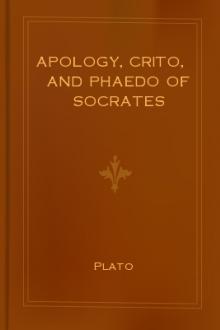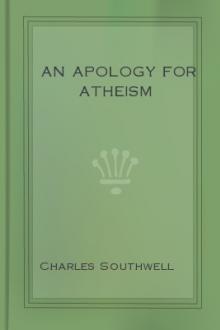Apology by Plato (best books to read for knowledge txt) 📖

- Author: Plato
- Performer: -
Book online «Apology by Plato (best books to read for knowledge txt) 📖». Author Plato
Strange, indeed, would be my conduct, O men of Athens, if I who, when I was ordered by the generals whom you chose to command me at Potidaea and Amphipolis and Delium, remained where they placed me, like any other man, facing death—if now, when, as I conceive and imagine, God orders me to fulfil the philosopher’s mission of searching into myself and other men, I were to desert my post through fear of death, or any other fear; that would indeed be strange, and I might justly be arraigned in court for denying the existence of the gods, if I disobeyed the oracle because I was afraid of death, fancying that I was wise when I was not wise. For the fear of death is indeed the pretence of wisdom, and not real wisdom, being a pretence of knowing the unknown; and no one knows whether death, which men in their fear apprehend to be the greatest evil, may not be the greatest good. Is not this ignorance of a disgraceful sort, the ignorance which is the conceit that a man knows what he does not know? And in this respect only I believe myself to differ from men in general, and may perhaps claim to be wiser than they are:—that whereas I know but little of the world below, I do not suppose that I know: but I do know that injustice and disobedience to a better, whether God or man, is evil and dishonourable, and I will never fear or avoid a possible good rather than a certain evil. And therefore if you let me go now, and are not convinced by Anytus, who said that since I had been prosecuted I must be put to death; (or if not that I ought never to have been prosecuted at all); and that if I escape now, your sons will all be utterly ruined by listening to my words—if you say to me, Socrates, this time we will not mind Anytus, and you shall be let off, but upon one condition, that you are not to enquire and speculate in this way any more, and that if you are caught doing so again you shall die;—if this was the condition on which you let me go, I should reply: Men of Athens, I honour and love you; but I shall obey God rather than you, and while I have life and strength I shall never cease from the practice and teaching of philosophy, exhorting any one whom I meet and saying to him after my manner: You, my friend,—a citizen of the great and mighty and wise city of Athens,—are you not ashamed of heaping up the greatest amount of money and honour and reputation, and caring so little about wisdom and truth and the greatest improvement of the soul, which you never regard or heed at all? And if the person with whom I am arguing, says: Yes, but I do care; then I do not leave him or let him go at once; but I proceed to interrogate and examine and cross-examine him, and if I think that he has no virtue in him, but only says that he has, I reproach him with undervaluing the greater, and overvaluing the less. And I shall repeat the same words to every one whom I meet, young and old, citizen and alien, but especially to the citizens, inasmuch as they are my brethren. For know that this is the command of God; and I believe that no greater good has ever happened in the state than my service to the God. For I do nothing but go about persuading you all, old and young alike, not to take thought for your persons or your properties, but first and chiefly to care about the greatest improvement of the soul. I tell you that virtue is not given by money, but that from virtue comes money and every other good of man, public as well as private.
This is my teaching, and if this is the doctrine which corrupts the youth, I am a mischievous person. But if any one says that this is not my teaching, he is speaking an untruth. Wherefore, O men of Athens, I say to you, do as Anytus bids or not as Anytus bids, and either acquit me or not; but whichever you do, understand that I shall never alter my ways, not even if I have to die many times.
Men of Athens, do not interrupt, but hear me; there was an understanding between us that you should hear me to the end: I have something more to say, at which you may be inclined to cry out; but I believe that to hear me will be good for you, and therefore I beg that you will not cry out. I would have you know, that if you kill such an one as I am, you will injure yourselves more than you will injure me. Nothing will injure me, not Meletus nor yet Anytus—they cannot, for a bad man is not permitted to injure a better than himself. I do not deny that Anytus may, perhaps, kill him, or drive him into exile, or deprive him of civil rights; and he may imagine, and others may imagine, that he is inflicting a great injury upon him: but there I do not agree. For the evil of doing as he is doing—the evil of unjustly taking away the life of another—is greater far.
And now, Athenians, I am not going to argue for my own sake, as you may think, but for yours, that you may not sin against the God by condemning me, who am his gift to you. For if you kill me you will not easily find a successor to me, who, if I may use such a ludicrous figure of speech, am a sort of gadfly, given to the state by God; and the state is a great and noble steed who is tardy in his motions owing to his very size, and requires to be stirred into life. I am that gadfly which God has attached to the state, and all day long and in all places am always fastening upon you, arousing and persuading and reproaching you. You will not easily find another like me, and therefore I would advise you to spare me. I dare say that you may feel out of temper (like a person who is suddenly awakened from sleep), and you think that you might easily strike me dead as Anytus advises, and then you would sleep on for the remainder of your lives, unless God in his care of you sent you another gadfly. When I say that I am given to you by God, the proof of my mission is this:—if I had been like other men, I should not have neglected all my own concerns or patiently seen the neglect of them during all these years, and have been doing yours, coming to you individually like a father or elder brother, exhorting you to regard virtue; such conduct, I say, would be unlike human nature. If I had gained anything, or if my exhortations had been paid, there would have been some sense in my doing so; but now, as you will perceive, not even the impudence of my accusers dares to say that I have ever exacted or sought pay of any one; of that they have no witness. And I have a sufficient witness to the truth of what I say—my poverty.
Some one may wonder why I go about in private giving advice and busying myself with the concerns of others, but do not venture to come forward in public and advise the state. I will tell you why. You have heard me speak at sundry times and in divers places of an oracle or sign which comes to me, and is the divinity which Meletus ridicules in the indictment. This sign, which is a kind of voice, first began to come to me when I was a child; it always forbids but never commands me to do anything which I am going to do. This is what deters me from being a politician. And rightly, as I think. For I am certain, O men of Athens, that if I had engaged in politics, I should have perished long ago, and done no good either to you or to myself. And do not be offended at my telling you the truth: for the truth is, that no man who goes to war with you or any other multitude, honestly striving against the many lawless and unrighteous deeds which are done in a state, will save his life; he who will fight for the right, if he would live even for a brief space, must have a private station and not a public one.
I can give you convincing evidence of what I say, not words only, but what you value far more—actions. Let me relate to you a passage of my own life which will prove to you that I should never have yielded to injustice from any fear of death, and that ‘as I should have refused to yield’ I must have died at once. I will tell you a tale of the courts, not very interesting perhaps, but nevertheless true. The only office of state which I ever held, O men of Athens, was that of senator: the tribe Antiochis, which is my tribe, had the presidency at the trial of the generals who had not taken up the bodies of the slain after the battle of Arginusae; and you proposed to try them in a body, contrary to law, as you all thought afterwards; but at the time I was the only one of the Prytanes who was opposed to the illegality, and I gave my vote against you; and when the orators threatened to impeach and arrest me, and you called and shouted, I made up my mind that I would run the risk, having law and justice with me, rather than take part in your injustice because I feared imprisonment and death. This happened in the days of the democracy. But when the oligarchy of the Thirty was in power, they sent for me and four others into the rotunda, and bade us bring Leon the Salaminian from Salamis, as they wanted to put him to death. This was a specimen of the sort of commands which they were always giving with the view of implicating as many as possible in their crimes; and then I showed, not in word only but in deed, that, if I may be allowed to use such an expression, I cared not a straw for death, and that my great and only care was lest I should do an unrighteous or unholy thing.
For the strong arm of that oppressive power did not frighten me into doing wrong; and when we came out of the rotunda the other four went to Salamis and fetched Leon, but I went quietly home. For which I might have lost my life, had not the power of the Thirty shortly afterwards come to an end.
And many will witness to my words.
Now do you really imagine that I could have survived all these years, if I





Comments (0)